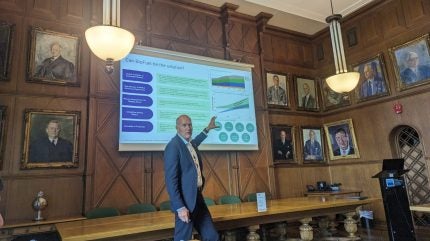
The Norwegian Shipowners’ Association has called on the EU, International Maritime Organisation (IMO), and Norwegian Government to create greater incentives for shipping companies to decarbonise.
Speaking at a press event in Oslo today (10 June), key members of the Norwegian Shipowners’ Association said it is crucial for the EU and IMO to clearly earmark funds for shipping decarbonisation initiatives.
The Norwegian Government should also create a “support fund” to incentivise companies to follow through on environmental commitments, according to Helene Tofte, executive director of the Department of International Cooperation and Climate at the Norwegian Shipowners’ Association.
Sovereign-funded decarbonisation?
In an industry that accounts for approximately 3% of global carbon emissions, maritime decarbonisation has been a slow-burning phenomenon.
The IMO’s targets are “still not aligned with the Paris Agreement”, said Oistein Jensen, chief sustainability officer at Odfjell, one of the Norwegian Shipowners’ Association’s 135 member companies.
The principal aim of the Norwegian Shipowners’ Association is to make the entire Norwegian fleet – one of the largest merchant fleets in the world – entirely carbon neutral by 2050.

US Tariffs are shifting - will you react or anticipate?
Don’t let policy changes catch you off guard. Stay proactive with real-time data and expert analysis.
By GlobalDataNorway holds the world’s largest sovereign wealth fund – valued at $1.3trn – which already invests in net-zero initiatives for the Scandinavian country’s extensive oil and gas industry.
Carrot and stick?
On top of government-backed decarbonisation support, Tofte, Jensen, and others called on the IMO and EU to earmark funds for the bloc’s Emissions Trading System (ETS) more clearly.
First established in 2005 but expanded to the shipping industry at the start of this year, the ETS requires maritime companies using EU ports to account for all their emissions. Companies that fail to surrender allowances are liable to an excess emissions penalty of €100 ($107) per tonne of CO2 equivalent.
The ETS lays out a decarbonisation timeline for shipping companies. In 2025, relevant companies will have to pay for 40% of their emissions reported in 2024, increasing to 70% in 2026 – and 100% in 2027.
Such a delay demonstrates how the EU has long prioritised net-zero efforts in other industries such as agriculture, steel, and cement, according to Jensen.
A report by the European Commission says maritime transport represents 3%-4% of the EU’s total CO2 emissions or over 124 million tonnes of CO2.
While Norway is not part of the EU, it adheres to “most of the same regulations”, Tofte added. Norwegian ships also regularly dock at EU ports.
“We believe we need that certainty”, Tofte told Ship Technology. “It’s extremely important that the IMO keeps to its timeline for environmental reasons and for investors wanting a return on investment”.
The Norwegian Shipowners’ Association did, however, hail the IMO’s net-zero by 2050 target as “historic” last July.
With former Norwegian Transport Minister Knut Arild Hareide poised to take over as CEO of the organisation in August, shipping firms will be watching attentively for signs of increased collaboration over decarbonisation initiatives between the Norwegian Shipowners’ Association, Norway’s Government, the IMO and EU.
Earlier this year in London, industry voices voiced similar concerns around the future of the maritime sector, criticising the IMO for “moving at glacial speed” when it comes to decarbonisation regulations.



